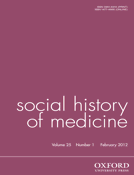-
Views
-
Cite
Cite
Shane Elizabeth Minkin, Hibba Abugideiri, Gender and the Making of Modern Medicine in Colonial Egypt, Social History of Medicine, Volume 25, Issue 1, February 2012, Pages 243–244, https://doi.org/10.1093/shm/hkr132
Close - Share Icon Share
Extract
Hibba Abugideiri's Gender and the Making of Modern Medicine in Colonial Egypt is an informative, well-researched book detailing the changing medical field in Egypt from the time of Mehmed Ali's regime through British colonial rule (1820s–1930s). Abugideiri situates her work within the fields of medical, colonial, Egyptian and gender history. She argues that medicine was intrinsically linked to state formation and state power by Mehmed Ali, the British and, eventually, nationalist doctors. In this way, she explores how the evolving understandings of gender roles led to new gender formations both within the medical field and burgeoning Egyptian nationalism.
The book has eight chapters, including the introduction and conclusion. Abugideiri structures the body chapters of the text to alternate between the creation of the medical profession as a whole and its specific impact on gender formation. Chapter 2 focuses on the origins of ‘modern’ medicine under Mehmed Ali and Clot Bey. Chapters 3 and 4 discuss the Anglicisation of education and medical education respectively. Chapter 5 introduces gender into the analysis, focusing on changes wrought to female medical practitioners. Chapter 6 tracks the emergence of a new, nationalised doctor in Egypt, and Chapter 7 shows how that doctor took his medical knowledge to the press to inform and critique Egyptian women in the domestic sphere. Throughout the book, Abugideiri shows that the Egyptian state and Egyptian doctors, in all their incarnations, never took to European medicine wholesale. Rather, medicine in Egypt developed in conversation with indigenous practitioners and European (mainly British) medical practice. Thus medicine serves both as a field in which we find natives complicit with the colonial regime as well as a space from which nationalist consciousness and action emerged.




